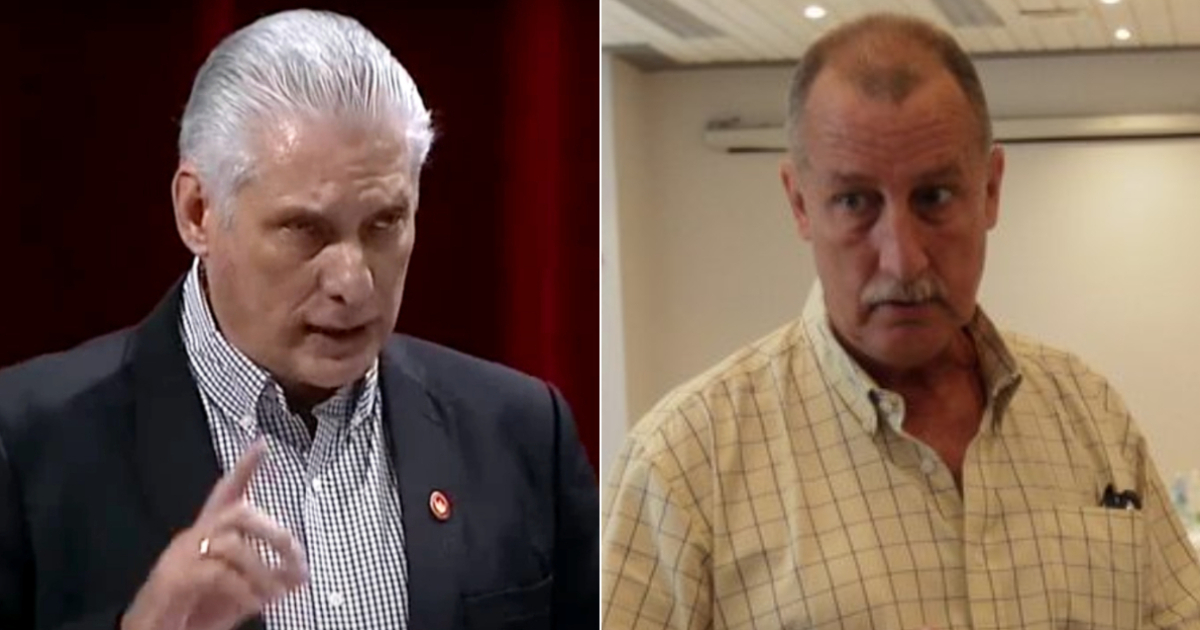Cuban economist Juan Triana Cordoví, a professor at the official Center for the Study of the Cuban Economy at the University of Havana, has criticized the economic measures taken by the government of Miguel Díaz-Canel and deemed it "regrettable" that he has not acknowledged his "responsibility" for their failure.
Triana Cordoví expressed his views in a post published on the blog of singer-songwriter Silvio Rodríguez (Segunda Cita). In it, the economist, who is affiliated with the regime and close to the Ministry of the Interior (MININT), took aim at the president's speech during the third ordinary session of the X Legislature of the National Assembly of People's Power (ANPP).
"The president has been describing the disaster for some time now, at least twice a year. However, I believe he failed to delve into the causes, and that, in my opinion, is lamentable," Triana Cordoví stated in a blog entry titled "Opinions of Economists by Mail."
Investment Missteps and Lack of Accountability
The economist highlighted that "for the past eight years, the Cuban government has concentrated investment in hotels (35% of the total) while neglecting investment in agriculture, fishing, the sugar industry, the food industry, and energy."
"The president's failure to recognize his personal responsibility and that of the government in this decision is very lamentable," Triana Cordoví asserted.
He went further, noting, "For nine years, we've been saying that foreign investment needs to be more flexible, but the same problems persist. All the 'barriers' have been identified, and measures have been proposed (a working group was even formed, and these measures were mentioned in a speech by Rodrigo Malmierca when he was Minister of Foreign Trade), but nothing has been done."
"Proposals to make state enterprises more flexible could fill drawers with papers, but today our state enterprises are in worse shape," the economist observed. He also criticized the failure of Cuban exports "due to the high degree of centralization and the lack of incentives for companies and their workers."
As an example, he cited the export of Cuban coffee. "Three years ago, among the 63 measures [for the development of the agricultural sector], was the decision to select 100 coffee producers to export directly. Yet, to this day, it's still just ink on paper."
Centralization and Economic Control
"In my personal opinion, it would be a mistake (and I believe a tragic one) to return to a process of greater centralization because it's already quite high. In Cuba, no company decides for itself where to invest, except for GAESA. All investment and resource allocation decisions are made at the highest levels of government, starting with foreign currency," Triana Cordoví pointed out.
Regarding the price caps imposed on products imported and sold by micro, small, and medium-sized enterprises (Mipymes), as well as the regime's announced crusade to "organize" this sector through increased pressure, impositions, control, and sanctions on "new economic actors," the economist also expressed his concerns.
"I think it's also a grave mistake to divide rather than add and to turn into enemies those who decided to stake their fortunes in Cuba, even if not for tremendously altruistic values," he said.
Supported by Silvio Rodríguez's platform and praised by other economists and historical regime figures like Humberto Pérez González (president of the Central Planning Board from 1976 to June 1985, among other positions), Triana Cordoví delivered further blows to Díaz-Canel's government.
Critique of Government Policies
"For me, it's a disgrace that, year after year, the president and his ministers go to the Assembly to recount the disasters caused by their erroneous policies and ask the people for more sacrifices. But it's even more disgraceful that the People's Deputies (because they are our deputies) continue to accept this situation," he expressed.
His deep criticism targeted the Cuban economic model, which he said, quoting Fidel Castro, "no longer works for us" and has led to the greatest economic and human decapitalization in Cuba's history, marked especially by the mass exodus of recent years.
"I say this with much pain, which I believe is shared by many, because I've seen my classrooms empty of students and the teaching departments of our universities empty of professors, hospitals without doctors trained thanks to the people's sacrifices (not the State's or its leaders'), our fields without farmers while there are fewer and fewer foods and more agricultural managers with 'yipetas,' and because, like all Cubans, every day we hear of another family broken by emigration."
Reaffirming his adherence to the old revolutionary ideals and confessing his "pain and anger," Triana Cordoví concluded: "A country without people is just a piece of land. A nation is not the sum of houses and roads. If we want to be socialists, we first need to have a nation; it's not the other way around."
Key Issues in Cuba's Economic Crisis
In light of Juan Triana Cordoví's critique of the Cuban government's economic policies, here are some important questions and answers to understand the situation better.
What are the main criticisms of Juan Triana Cordoví regarding Cuba's investment strategies?
Triana Cordoví criticizes the Cuban government for concentrating 35% of its investment in hotels over the past eight years, neglecting essential sectors like agriculture, fishing, the sugar industry, the food industry, and energy.
Why does Triana Cordoví believe that greater centralization would be a mistake?
Triana Cordoví argues that increasing centralization would be a tragic mistake because it would further limit the decision-making power of companies and exacerbate existing issues, as all investment and resource allocation decisions are already made at the highest levels of government.
What does Triana Cordoví say about the impact of the Cuban economic model on society?
He states that the current economic model has led to significant economic and human decapitalization, citing the mass exodus of professionals and the decline in essential services like education and healthcare.
